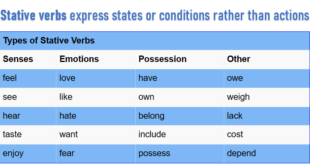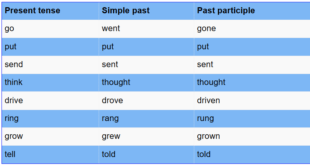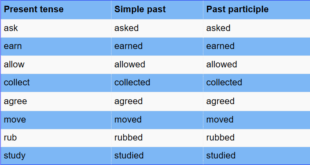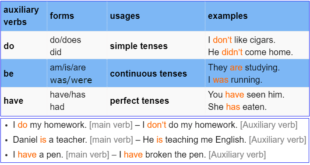![]()
We use the present perfect tense to talk about a past action or event that has an effect on or connection with the present. It doesn’t show the exact time in the past, but the present result is important.
- I have eaten lunch.
- She has learned to speak English.
- We have watched the movie.
We use the present perfect tense with an unfinished time expression.
- Have you seen him today?
- Nobody has noticed so far.
- I haven’t eaten since breakfast.
- Have you ever been to America?
- Have you talked to John yet?
- I haven’t smoked this week.
- I have never heard this in my life.
In the present perfect, “have” or “has” is a helping verb, and the main verb is in past participle form.
- You have been helpful so far.
- She has eaten breakfast.
- We have seen him today.
Form: subject + have/has + main verb [past participle form]
| Subject | have/has [helping verb] | main verb |
| I | have | played. |
| You | have | played. |
| He/She/It | has | played. |
| We | have | played. |
| You | have | played. |
| They | have | played. |
We can use the verb “have” as a main verb in past participle form along with helping verb “have/has”.
- I have had a lot to do this week.
- She has had an easy life.
- Our car has had a flat tire today.
- We have had a lot of rain this year.
Contractions in the present perfect tenses
| Affirmative | Negative (recommended) | Negative (also correct) |
| I‘ve played | I haven’t played. | I‘ve not played. |
| You‘ve played | You haven’t played. | You‘ve not played. |
| He‘s played | He hasn’t played. | He‘s not played. |
| She‘s played | She hasn’t played. | She‘s not played. |
| It‘s played | It hasn’t played. | It‘s not played. |
| We‘ve played | We haven’t played. | We‘ve not played. |
| You‘ve played. | You haven’t played. | You‘ve not played. |
| They‘ve played | They haven’t played. | They‘ve not played. |
Question form: have/has + subject + main verb [past participle form] +?
- Have you parked?
- Has she cooked?
- Have they eaten?
We can use the words (who, what, when, where, why, how) before has or have in interrogative sentences.
- Where have you parked?
- How has she cooked?
- What have they eaten?
A regular verb has usual ending in its past and past participle forms.
| Present tense | Simple past | Past participle |
| ask | asked | asked |
| earn | earned | earned |
| allow | allowed | allowed |
| collect | collected | collected |
| agree | agreed | agreed |
| move | moved | moved |
| rub | rubbed | rubbed |
| study | studied | studied |
Verbs that end in “e”, we just add “d” to make them past or past participle.
- arrive: arrived, arrived
- bake: baked, baked
- change: changed, changed
- close: closed, closed
For verbs that end in “consonant + vowel + consonant”; we double the last consonant and add “ed”.
- control: controlled, controlled.
- grab: grabbed, grabbed.
- rub: rubbed, rubbed.
- drag: dragged, dragged.
Some verbs that end in “y” and have a consonant before them, we take out the “y” and add “ied” to make them past or past participle.
- study: studied, studied.
- worry: worried, worried.
- try: tried, tried.
Irregular verbs do not follow the -d, ed, or -ied suffix pattern.
| Present tense | Simple past | Past participle |
| go | went | gone |
| send | sent | sent |
| think | thought | thought |
| drive | drove | driven |
| ring | rang | rung |
| grow | grew | grown |
| tell | told | told |
To avoid making mistakes with irregular verbs, we should learn them by heart.
| Simple Present (v1) | Simple Past (v2) | Past Participle (v3) |
| arise | arose | arisen |
| awake | awoke or awaked | awaked or awoken |
| am, is, are | was, were | been |
| bear | bore | borne or born |
| beat | beat | beaten |
| become | became | become |
| begin | began | begun |
| bend | bent | bent |
| bet | bet | bet |
| bid | bid | bid |
| bid | bade | bidden |
| bind | bound | bound |
| bite | bit | bitten or bit |
| bleed | bled | bled |
| blow | blew | blown |
| breed | bred | bred |
| break | broke | broken |
| breed | bred | bred |
| bring | brought | brought |
| broadcast | broadcast | broadcast |
| build | built | built |
| burn | burnt/burned | burnt/burned |
| burst | burst | burst |
| buy | bought | bought |
| can | could | been able |
| cast | cast | cast |
| catch | caught | caught |
| choose | chose | chosen |
| cling | clung | clung |
| come | came | come |
| cost | cost | cost |
| creep | crept | crept |
| cut | cut | cut |
| deal | dealt | dealt |
| dig | dug | dug |
| dive | dived or dove | dived |
| do | did | done |
| draw | drew | drawn |
| dream | dreamed or dreamt | dreamed or dreamt |
| drink | drank | drunk |
| drive | drove | driven |
| eat | ate | eaten |
| fall | fell | fallen |
| feed | fed | fed |
| feel | felt | felt |
| fight | fought | fought |
| find | found | found |
| flee | fled | fled |
| fling | flung | flung |
| fly | flew | flown |
| forbid | forbade or forbad | forbidden |
| forget | forgot | forgotten or forgot |
| forgive | forgave | forgiven |
| forsake | forsook | forsaken |
| freeze | froze | frozen |
| get | got | got or gotten |
| give | gave | given |
| go | went | gone |
| grind | ground | ground |
| grow | grew | grown |
| hang | hung | hung |
| have | had | had |
| hear | heard | heard |
| hide | hid | hidden |
| hit | hit | hit |
| hold | held | held |
| hurt | hurt | hurt |
| keep | kept | kept |
| kneel | knelt | knelt |
| know | knew | known |
| lay | laid | laid |
| lead | led | led |
| lean | leant/leaned | leant/leaned |
| leap | leaped or leapt | leaped or leapt |
| learn | learnt/learned | learnt/learned |
| leave | left | left |
| lend | lent | lent |
| let | let | let |
| lie | lay | lain |
| light | lighted or lit | lighted or lit |
| lose | lost | lost |
| make | made | made |
| mean | meant | meant |
| meet | met | met |
| overtake | overtook | overtaken |
| pay | paid | paid |
| put | put | put |
| prove | proved | proved or proven |
| quit | quit | quit |
| read | read | read |
| rid | rid | rid |
| ride | rode | ridden |
| ring | rang | rung |
| rise | rose | risen |
| run | ran | run |
| say | said | said |
| see | saw | seen |
| seek | sought | sought |
| sell | sold | sold |
| send | sent | sent |
| set | set | set |
| shake | shook | shaken |
| shed | shed | shed |
| shine | shone | shone |
| shoot | shot | shot |
| show | showed | shown or showed |
| shrink | shrank | shrunk |
| shut | shut | shut |
| sing | sang | sung |
| sink | sank or sunk | sunk |
| sit | sat | sat |
| slay | slew | slain |
| sleep | slept | slept |
| sling | slung | slung |
| smell | smelt | smelt |
| sneak | sneaked or snuck | sneaked or snuck |
| speak | spoke | spoken |
| spell | spelt/spelled | spelt/spelled |
| spend | spent | spent |
| spill | spilt/spilled | spilt/spilled |
| spin | spun | spun |
| spit | spat | spat |
| spread | spread | spread |
| spring | sprang or sprung | sprung |
| stand | stood | stood |
| steal | stole | stolen |
| stick | stuck | stuck |
| sting | stung | stung |
| stink | stank or stunk | stunk |
| stride | strode | stridden |
| strike | struck | struck |
| strive | strove | striven |
| swear | swore | sworn |
| sweep | swept | swept |
| swim | swam | swum |
| swing | swung | swung |
| take | took | taken |
| teach | taught | taught |
| tear | tore | torn |
| tell | told | told |
| think | thought | thought |
| throw | threw | thrown |
| understand | understood | understood |
| wake | woke or waked | waked or woken |
| wear | wore | worn |
| weave | wove or weaved | woven or wove |
| weep | wept | wept |
| win | won | won |
| wind | wound | wound |
| wring | wrung | wrung |
| write | wrote | written |





I saw a lot of website but I believe this one holds something extra in it